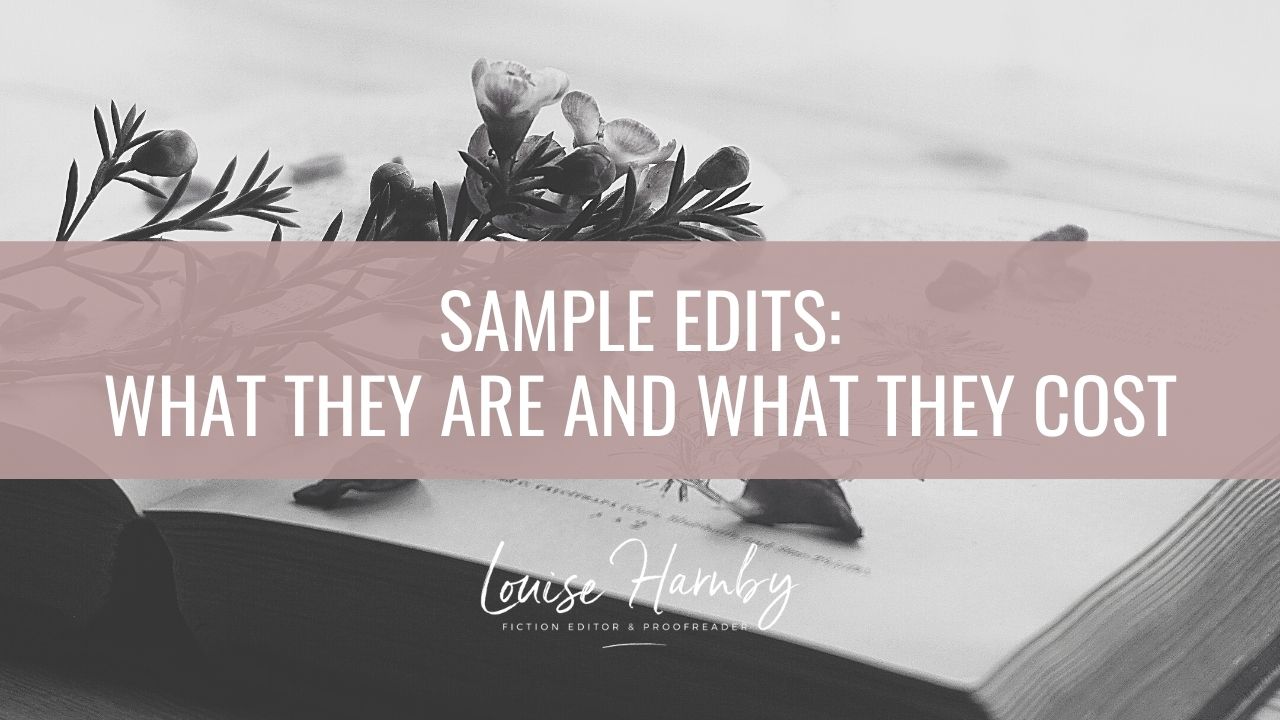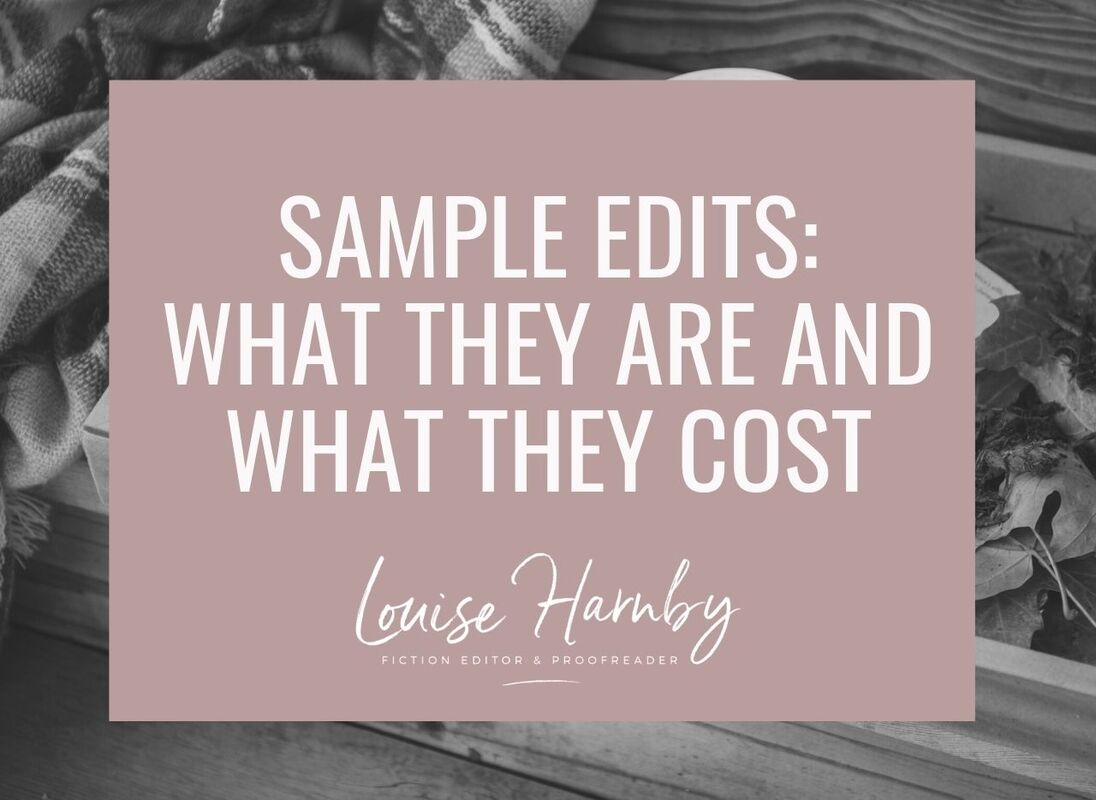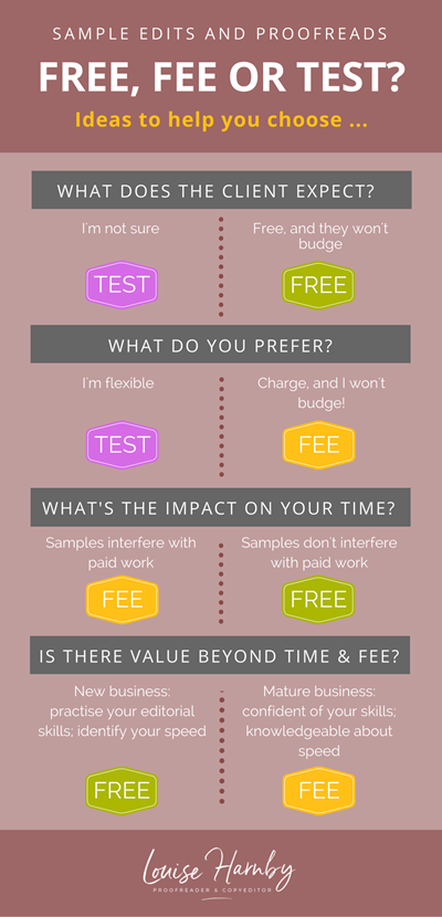|
Many independent authors want to see a sample of an editor or proofreader's work prior to signing a contract for editorial services. This post discusses sample edits, why they're useful, and what they cost.
Sample edits give the author the opportunity to compare the work of several different professionals and to assess the editing or proofreading against the price being quoted.
The editor needs to be sensitive to the author’s style, the characters’ voices and the mood of the scene such that the soul of the writing remains intact. Samples help the author to compare editors’ technical competence and their emotional responsiveness to the text. In this case, the question is not so much 'Who’s the best?' but 'Who’s the best fit?' What’s in it for the editor or proofreader? Samples are beneficial for the editorial pro, too. Here are some of my reasons for doing sample edits: Tangled terminology Definitions of the different levels of editing vary widely from client to client and editor to editor. What X calls proofreading, Y would call copyediting. What Y calls copyediting might be called line editing by Z. And where definitions differ, so do expectations. Working on a sample enables me to assess what’s required – regardless of the word(s) being used to describe that service. Time: How long does it take? Doing a sample edit shows me how long it takes to work through, say, a thousand words. That means I can estimate how many hours the project will take to complete and whether/when there’s an appropriate slot in my schedule. A 100K-word novel that needs copyediting for spelling, punctuation and grammar errors and inconsistencies, and only a little tweaking for clarity may take 35 hours (one to two weeks in my schedule); a novel of the same length that requires a deeper line edit may take 100 hours (four to six working weeks in my schedule). Appropriate pricing Once I know roughly how long the project will take to complete, I can price it accordingly. Am I a good fit? I usually find that the process of immersing myself in the author’s words comes easily. In the case of a deeper line-editing sample, the work will certainly be time-consuming but I can feel my way through – mimicking the author so that my edits (or suggested recasts) improve and complement the original writing rather than rubbing up against it. This isn’t always the case, though. Sometimes I’m just not a good fit – it’s not obvious how I can put the ooh! into the writing. It’s not that the amendments I’m making are technically incorrect but rather that I’m not able to find that emotional responsiveness that the client needs. When that happens, it’s time to thank the author for the opportunity to do the sample and provide a quotation, but recommend they work with someone else. Why I charge a fee for samples I usually charge a set fee of £50 for a sample of 1,000 words. Some of my colleagues offer free sample edits, so why do I charge? My professional time has a cost to it Every minute that I spend doing free editorial work is a minute I could be spending on paid-for work for clients or maintaining my business’s visibility (which is what leads clients to me in the first place). Scheduling problems Because I’m visible, I have little spare time in my schedule to fit in additional work, and certainly not free work. It’s not as off-putting as you might think I was curious as to whether potential clients would object to my charging for samples. In fact, since I introduced the policy last year, most enquirers have reacted to my fee positively – ‘Of course, not a problem’ is the standard response. This allows me to treat sampling like any other job I’m commissioned for. Filtering There have been cases, though they’re rare, where a client has asked 20 or 30 editors from my professional editorial society for a sample edit, and the chapters offered are all different. It appears that the enquirer is looking for a backdoor to a free complete book edit, farming out bits and pieces here and there. Charging for samples enables me to filter out the cheats. The benefits of the gratis option Charging for sample edits may not be the best course of action for all editorial freelancers. While I’ve encountered little objection to date, there are some perfectly legitimate clients who expect a small sample to be edited for free on the understanding that an hour or two of gratis work is acceptable given the reasonable odds of securing the full project. Here are some reasons why you might decide that free sample edits are the best option: New entrant/low visibility If you’re a new entrant to the field and are still building your discoverability, you might well decide that you want to take every opportunity possible to secure paying work. And if that means doing a few small freebies here and there, that’s a price you’re willing to pay. In this case, you’d be justified in regarding free samples as part of your marketing strategy. I think this is a valid argument. In my start-up phase, I didn’t charge for samples for this very reason. Scheduling If you’re still building your business, you may have space in your schedule that more experienced and visible colleagues don’t have. In that case, the opportunity cost of doing a free sample will not be as high. Continued professional development (CPD) You could view the opportunity to do free samples as a way of developing your experience. You can apply what you’ve learned in training to live test cases. By tracking whether these sample edits convert into commissions, you’ll be able to glean whether what you’re doing is appealing (or not) to potential clients. If you’re a new entrant to the field, sampling can be an invaluable teaching tool that gently introduces you to texts that need very different levels of attention. The safe space When I started up my business, the one thing that worried me was the element of surprise. What if the proofread I’d been commissioned for turned out to be a complete nightmare? What if in only reading the text, rather than actually working on it, I’d vastly underestimated the speed at which I could work and therefore undercharged? Doing samples is a great way for the new starter to get a good sense of what they’re taking on, but in a safe space with no obligations. And because no money’s changed hands, there’s no chance of complaint because of misunderstandings over what’s on offer (from either the editor or the client). It's not worth charging Our international editing community is diverse, and we do a lot of different things for many different client types. Sometimes charging is more effort than it's worth. Here's Erin Brenner: 'I do free samples of up to 1,000 words. This allows me to show my value and ease any concerns about the edit. However, I work for corporate clients with ongoing work and multiple stakeholders. Charging for a sample edit would also mean getting the accounting department involved, which is more effort than its worth for both sides.' Make your own choice I charge for sample edits (most of the time); others offer freebies. Some of my colleagues don’t offer sample edits at all, free or paid-for. There’s no right or wrong choice. How you decide to handle the issue should be based on what’s right for you, not on what others are doing. Consider your availability, your stage of editorial business ownership, whether free sampling could be a marketing or CPD tool, and how comfortable you are with the possibility that some legitimate clients could be discouraged by charges. Think about doing a test over the course of a year – commit four months each to offering free samples, paid-for samples and no samples, and track your conversions. The results may surprise you! Here's something to help you decide whether free, fee or test is the best approach to handling sample edits. Hope you find it useful! And if you want a flavour of what other editors are doing, take a look at the lively discussions on LinkedIn and Facebook that emerged when I posted links to this article.
Louise Harnby is a line editor, copyeditor and proofreader who specializes in working with crime, mystery, suspense and thriller writers.
She is an Advanced Professional Member of the Chartered Institute of Editing and Proofreading (CIEP), a member of ACES, a Partner Member of The Alliance of Independent Authors (ALLi), and co-hosts The Editing Podcast. Visit her business website at Louise Harnby | Fiction Editor & Proofreader, say hello on Twitter at @LouiseHarnby, connect via Facebook and LinkedIn, and check out her books and courses.
16 Comments
I used to do free sample edits, but as I've gained more experience, I started to charge $50 in the past year. If the writer than chooses to go with my services, I'll apply that toward the cost of the overall project. I also have permission from a client to send a my copyedit of their magazine article to potential clients as a sample, and I've posted a copyediting and proofreading sample of my work on my site (though I should probably update it one of these days...). On the one hand, I don't think it's totally out of line for a writer to request a free sample edit, but in how many other fields of work does that happen?
Reply
Louise Harnby
22/1/2018 05:04:31 pm
Hi, Jeri. It does seem to be very common in our profession. One of the problems is that, unlike in some other trades, the supplier doesn't always have credentials that will protect the buyer if things don't go to plan (think of ABTA in the travel industry). And so perhaps that's why an informal system of earning trust developed, without money changing hands.
Reply
22/1/2018 08:40:06 pm
I provide free sample edits of approximately 1,000 words. I request at least three chapters (and the full manuscript whenever possible) and I choose the selection of text to edit, often from more than one chapter. I use the sample edit not only to calculate my time and fee, but also to show the author the value I bring to the project. That's why I choose text that needs help, not just 1,000 words from the first chapter, which is what many authors will send unless instructed otherwise. A sample edit is as much for me as it is for the author.
Reply
Louise Harnby
23/1/2018 09:45:32 am
Thanks, Candace. Agree that we both benefit from the sample. I like the way you structure the sampling process. Great advice!
Reply
Louise Harnby
23/1/2018 03:52:45 pm
That's a good point - there's a difference between a test that one might do for a publisher, and there's a longer-term relationship involved and multiple projects. Though one could argue that for series indie authors the same would apply. Love the fact that opinion on this is so diverse! Thanks for chipping in!
Reply
23/1/2018 06:15:10 pm
Louise,
Reply
Louise Harnby
23/1/2018 10:24:42 pm
We worked out the sneaky person because they contacted lots of people from the SfEP and the subject came up in the forum!
Reply
CeCe
10/1/2019 06:03:25 am
Have you ever done a 1K sample and found no errors? If not, what's your next step? Would you accept the job and move forward with proofing or editing the whole MS?
Reply
Louise Harnby
10/1/2019 10:57:10 am
Just to be clear, I’m not just looking for literal errors. I’m also using the sample to get a sense of whether I can get under the skin of the writing so that I can help the author improve the story at sentence level. In this case, it’s a subjective experience. So some of my authors are excellent grammarians and spellers but overwrite. Some don’t hold POV as well as they might. In those cases, it’s not about fixing errors but about making suggestions and recasts.
Reply
5/7/2019 10:00:40 pm
More than 90 percent of my editing is developmental, and so I don't offer samples at all. It's impossible to do big-picture edits (or even an evaluation) without first reading the entire manuscript. The few times I've been asked to do a sample for line editing (and it is very rare), I did charge, but if they later decided to move forward for a full edit their sample fee was deducted from the cost of the full edit. Although I had to reread the pages from the sample when I did the full edit, it was time well spent for me since I was better able to determine the amount of time and effort that would go into that author's work, thus charging appropriately for the project.
Reply
Louise Harnby
5/7/2019 10:52:45 pm
Agreed! That's exactly why I focused on proofreading, copyediting and line editing. I don't offer them for my mini line critiques either - it's very much a sample of done-for-you sentence-level editing.
Reply
Emily
9/7/2020 05:30:44 pm
Thank you for this excellent post! I have now decided to charge for samples once my proofreading business is established. In the meantime, would you recommend a new starter offer a free sample in exchange for a testimonial to potential clients who probably wouldn't be able to afford a proofreader (e.g. small, independent publishers and some equine charities) or would it be better to offer free services for a given amount of time (e.g. 3 months)/number of hours/number of words?
Reply
Louise Harnby
9/7/2020 11:22:19 pm
Hi, Emily!
Reply
Emily
10/7/2020 12:10:05 pm
Thank you for your helpful response, Louise!
Louise Harnby
12/7/2020 09:24:27 pm
Hi again, Emily! Leave a Reply. |
BLOG ALERTSIf you'd like me to email you when a new blog post is available, sign up for blog alerts!
TESTIMONIALSDare Rogers'Louise uses her expertise to hone a story until it's razor sharp, while still allowing the author’s voice to remain dominant.'Jeff Carson'I wholeheartedly recommend her services ... Just don’t hire her when I need her.'J B Turner'Sincere thanks for a beautiful and elegant piece of work. First class.'Ayshe Gemedzhy'What makes her stand out and shine is her ability to immerse herself in your story.'Salt Publishing'A million thanks – your mark-up is perfect, as always.'CATEGORIES
All
ARCHIVES
July 2024
|
|
|
|


















 RSS Feed
RSS Feed





